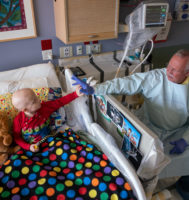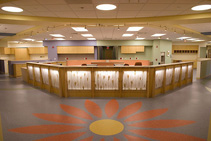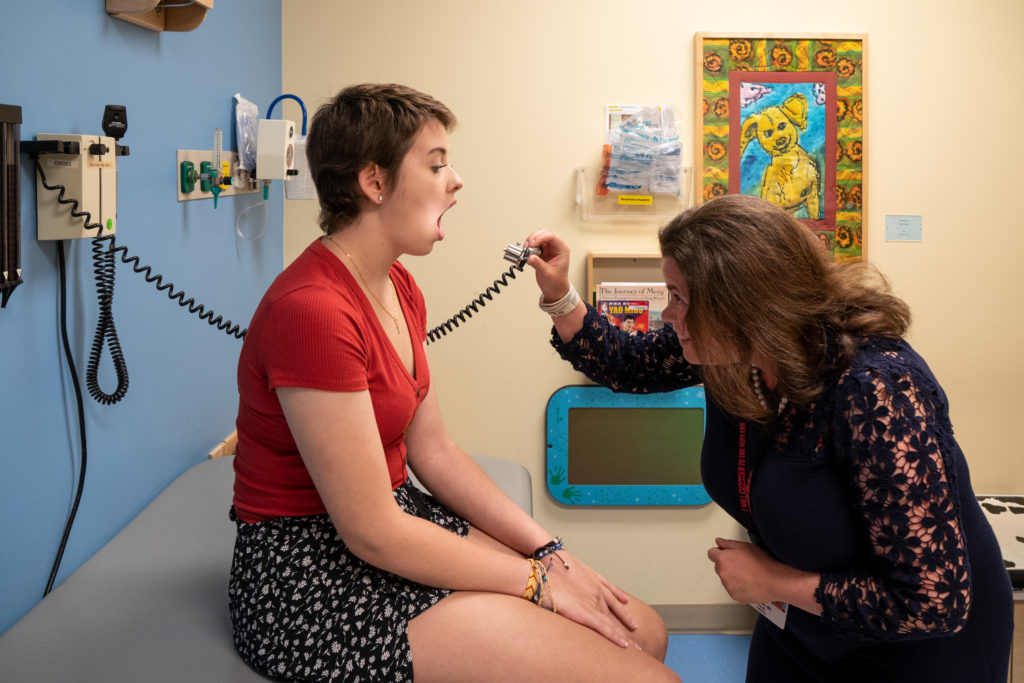 Objectives
Objectives
- To develop a knowledge base in the pathophysiology of hematologic, immunologic, and oncologic disorders; the pharmacology and use of chemotherapeutic agents; the fundamental principles of radiation oncology; blood banking; coagulation; nutrition and bone marrow transplantation; and the diagnosis and management of infectious complications seen in the immunosuppressed host
- To use the broad databases of history, physical examination, and laboratory evaluation to develop a systematic, logical approach to clinical decision making
- To include ethical, socio-economic, and physiological considerations when developing a comprehensive treatment plan appropriate to the unique circumstances of each patient

themed inpatient floor is seen
during a media tour of the
American Family Children’s
Hospital.
Fellow Roles on the Inpatient Service
- Lead daily family-centered, multidisciplinary rounds
- Perform inpatient consults at American Family Children’s Hospital and the NICUs at Meriter Hospital and St. Mary’s Hospital.
- With attending staff, deliver inpatient lectures for resident team
- Take home call four nights per service week
- Triage and evaluate hematology and oncology consults and referrals from outside facilities
- Assume primary hematologist/oncologist responsibilities for patients who are newly diagnosed during the fellow’s inpatient service weeks
- Perform procedures such as CAR T infusions, bone marrow aspirate and biopsy, lumbar puncture, intrathecal administration of chemotherapy, bone marrow harvest, hematopoietic stem cell infusion and exchange transfusion on all patients admitted to the inpatient service
Fellow Roles in Outpatient Clinics
- See primary patients and new referrals in continuity clinic one half day per week
- Write electronic chemotherapy orders for primary oncology patients
- Rotate through subspecialty focus areas, spending 4-6 weeks concentrating on various subspecialties of pediatric hematology/oncology, including bone marrow transplant, neuro-oncology, palliative care, pathology, radiation oncology, transfusion medicine and benign hematology
- Perform procedures such as CAR T infusions, bone marrow aspirate and biopsy, lumbar puncture, intrathecal administration of chemotherapy, bone marrow harvest, and exchange transfusion on all patients seen in outpatient clinics
Multidisciplinary Clinics
- Hematopoietic stem cell transplant clinic
- Comprehensive sickle cell clinic
- Comprehensive bleeding disorders clinic
- Comprehensive neuro-cutaneous disorders clinic
- Comprehensive neuro-oncology clinic
- Caring For Life clinic (late effects and long term followup)
- Vascular anomalies clinic
Quality Improvement
Each fellow is expected to participate in a clinical QI project, either devised by the fellow or as part of a prior project that receives substantial contribution from the fellow. Ongoing/recent QI efforts in our division include:
- Developing hospital-wide guidelines for sharing life-altering information with pediatric patients and their families;
- Understanding rates of hospital-acquired conditions in pediatric hematology/oncology patients;
- Working with multidisciplinary team to decrease rates of Central Line Associated Blood Stream Infections in pediatric hematology/oncology patients;
- Creating an algorithm with our pediatric surgery and interventional radiology colleagues to ensure optimal central line choices for our patients;
- Establishing criteria for transplant-associated thrombotic microangiopathy;
- Optimizing communication with infusion center staff to care for patients after hours; and
- Working with pediatric critical care staff and pharmacy to reduce rates of hospital acquired venous thromboembolisms.
